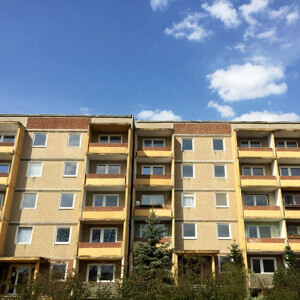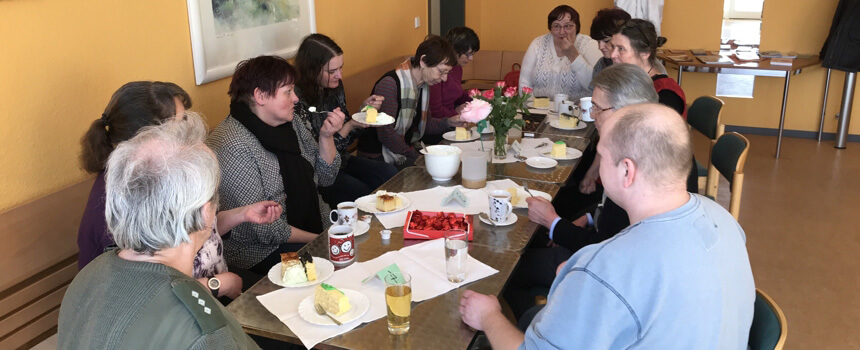 Lunch on two wheels
Lunch on two wheels
Allowing the elderly to participate in town life
“I don't know where I am. What has been here? The ghost town begins – here deep in the east.” This song of the German artist Clueso is called Ghost Town. It’s about forgotten places in eastern Germany that are slowly and quietly disappearing after the fall of communism. The district of Hohenstücken in Brandenburg an der Havel is such a place. Many have left, few have remained. More and more blocks of flats are disappearing and with them the people. Hohenstücke is shrinking. But a group of long-term unemployed people and pensioners have found each other and are not willing to accept this development. They try to breathe new life into the district with a social café - the Café Miteinander. Coffee and cake and a warm lunch are served here. The older people from the quarter jointly prepare the warm lunch and then eat it together. It offers space for conversation and the people can share their concerns and find people who will listen to them.
Necessity
Wholesome meals and social participation to prevent the isolation of the elderly in need in a shrinking district.
Activity
Delivery of a hot meal made from home-grown ingredients to people who are not mobile because of their age or infirmity.
Countable effort
Number of meals delivered to households in need.
Result
The lunch gets to the people in need in their homes. Of every lunch, 10 meals are delivered.
Systemic effect
The community garden and the lunch on wheels are well-established. Social participation of the elderly who are lonely will be strengthened.
Background
In the 70s, the district of Hohenstücken was built to house steel workers. After the end of the GDR and the disappearance of the steel industry, the district became less attractive. Those who could afford to moved away. This left behind mainly the less mobile and the financially weak. Today, the proportion of people dependent on social benefits is just under 50%.
The population is ageing rapidly and the situation of those in need of assistance and care is also inadequate due to a shortage of nursing staff. There is a high level of poverty among the elderly. The proportion of basic security recipients over the age of 65 is three times higher than in the rest of the town (Stadt Brandenburg an der Havel, 2014). These people often lack social connection.
The good deed
The donation will be used to purchase a cargo bicycle, warming boxes and serving solutions that will allow it to bring the lunches to those people who are unable to come to the café due to their age or infirmity. Volunteers then deliver the food to those in need. An important side-effect is that people are regularly visited and are asked how they are doing and whether they need further help. In addition, the town of Brandenburg provides a garden property which is open to all residents and initiatives of the district. The AuWiHo association would like to use part of the community garden to plant a variety vegetables and fruits, which are then processed at the café for lunch. The donation of 24 good deeds will help to set up raised beds and plant seedlings. The community is strengthened and the ghost town becomes a greener, warmer and more lively place for everyone.

AboutGermany
Berlin
Capital
82 521 653
Number of inhabitants
46.136
Gross domestic product per capita per year
5
Human Development Index
The wealth distribution in Germany is ever more unequal. Between 2003 and 2015, the number of the elderly living in poverty has doubled (Der Paritätische, 2018).
About the organization and further information
Association
Arbeiten und Wohlfühlen in Hohenstücken e.V.
Website
https://www.quartiersbetrieb-hohenstuecken.de/neuigkeiten/2017/12/20/sqy4y15lmc9q7kem0wbyca5dymx4tg




